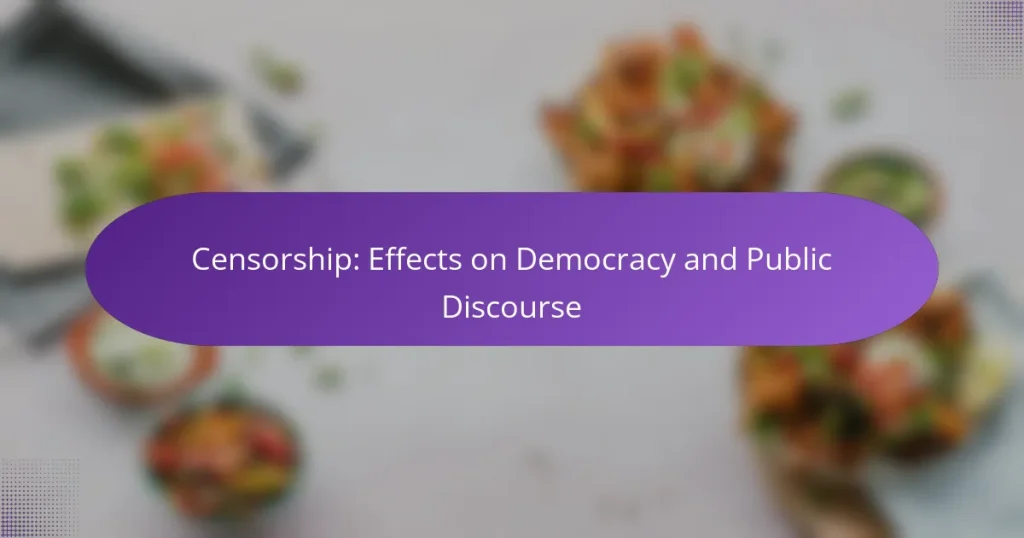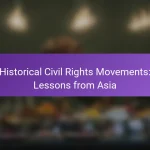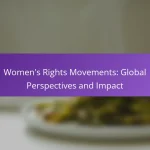Censorship poses a serious threat to democracy by curtailing free expression and hindering the exchange of diverse ideas. This restriction not only disengages the public but also creates a narrow narrative that fails to capture the complexities of society. To combat these effects, it is essential to promote free expression and enhance access to information through various strategies.
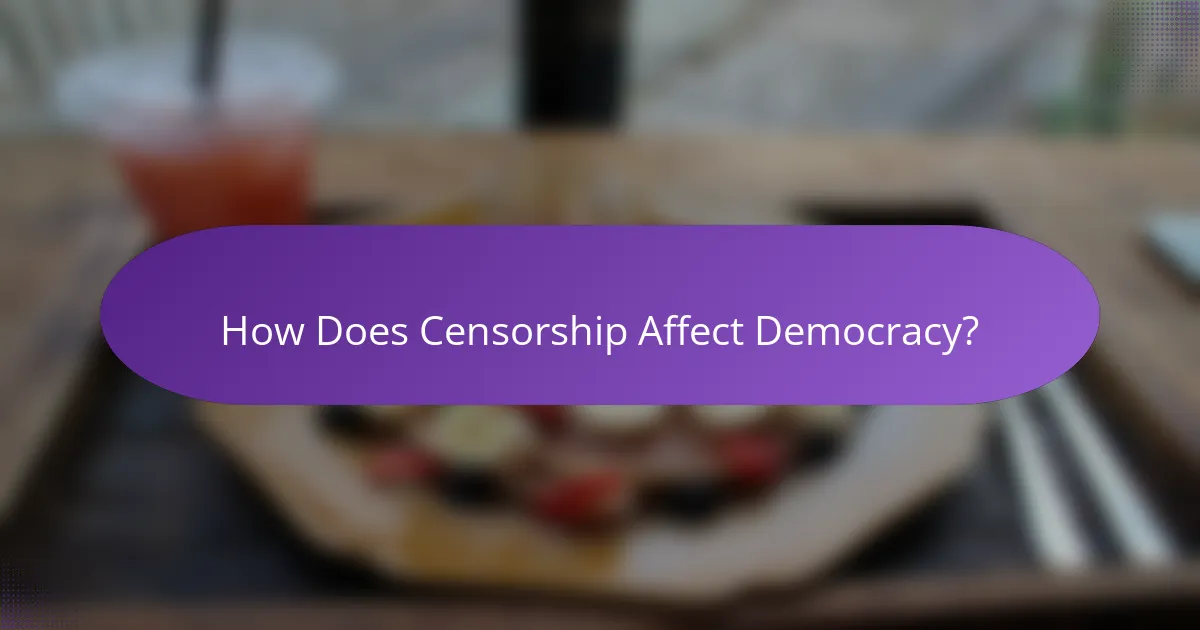
How Does Censorship Affect Democracy?
Censorship significantly undermines democracy by restricting free expression and limiting the flow of information. This suppression can lead to a disengaged public and a weakened democratic process.
Reduces political participation
Censorship can diminish political participation by creating an environment where individuals feel unsafe to express their opinions. When citizens fear repercussions for voicing dissent, they are less likely to engage in political discussions or activities.
This reduction in participation can manifest in lower voter turnout and fewer people attending public forums or debates, ultimately weakening the democratic process. For instance, in countries with strict censorship laws, voter engagement often drops significantly compared to those with more open discourse.
Limits access to information
Censorship restricts access to vital information, which is essential for informed decision-making in a democracy. When certain viewpoints or facts are suppressed, citizens cannot fully understand the issues at stake.
This limitation can lead to a misinformed public, unable to make educated choices during elections or civic discussions. For example, if media outlets are censored, the public may only receive a narrow perspective on political events, skewing their understanding and opinions.
Undermines trust in institutions
Censorship can erode trust in governmental and media institutions, as citizens may perceive them as biased or untrustworthy. When information is manipulated or withheld, skepticism grows, leading to a disconnect between the public and their leaders.
This distrust can result in widespread cynicism about the political system, making it difficult for institutions to function effectively. In environments where censorship is prevalent, citizens often turn to alternative sources of information, which may not always be reliable, further complicating the issue of trust.
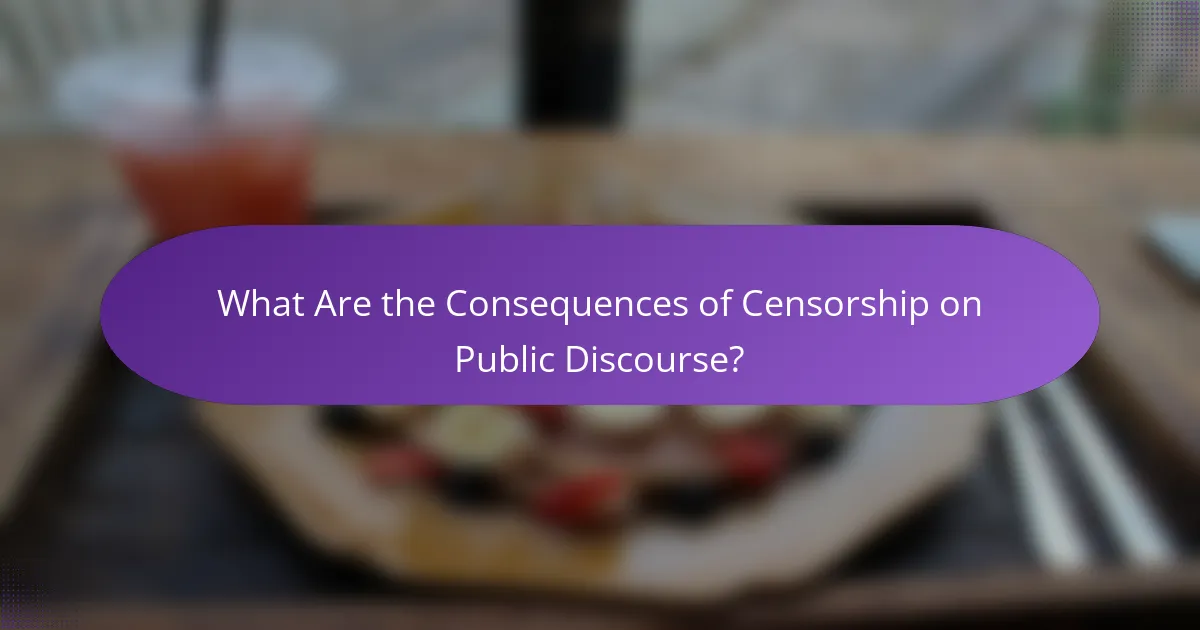
What Are the Consequences of Censorship on Public Discourse?
Censorship significantly undermines public discourse by limiting the exchange of ideas and restricting access to diverse perspectives. This suppression can lead to a homogenized narrative that fails to represent the complexities of society.
Stifles diverse viewpoints
Censorship directly stifles diverse viewpoints by preventing individuals from expressing differing opinions. When certain topics or perspectives are deemed unacceptable, it creates an environment where only dominant narratives are heard, marginalizing minority voices.
This lack of diversity can lead to a skewed understanding of societal issues, as critical discussions are silenced. For example, in countries with strict media regulations, dissenting opinions on political matters are often suppressed, resulting in a public that is uninformed or misinformed.
Encourages echo chambers
Impacts social movements
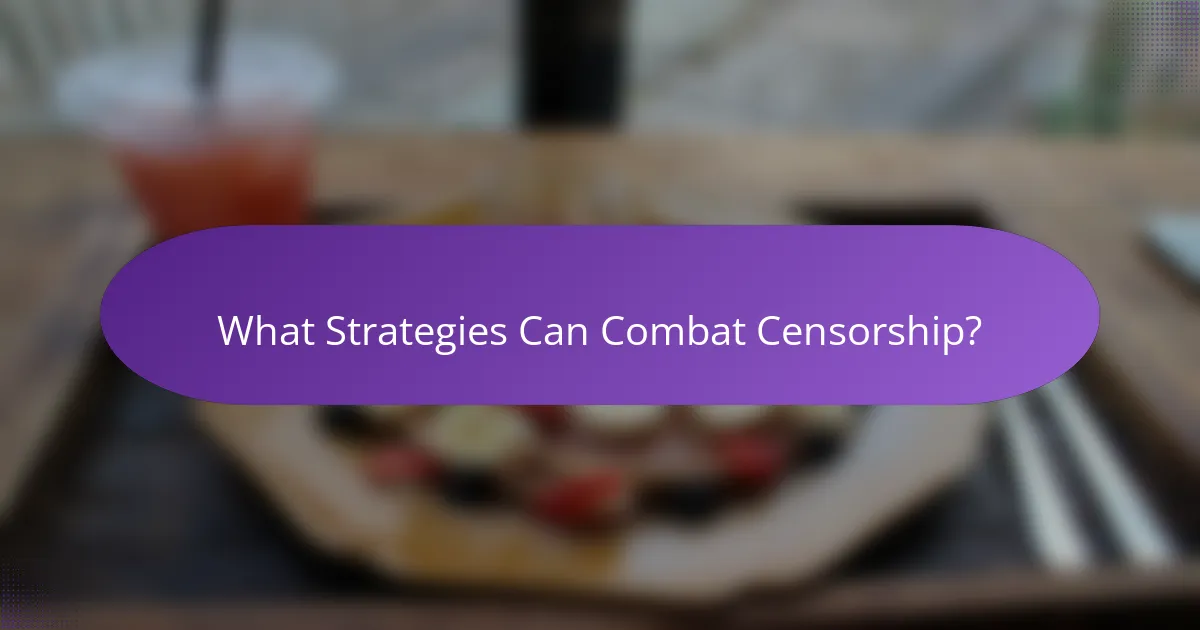
What Strategies Can Combat Censorship?
Combating censorship requires a multifaceted approach that empowers individuals and organizations to promote free expression and access to information. Key strategies include enhancing digital literacy, supporting free speech organizations, and utilizing technology like VPNs and encryption.
Promoting digital literacy
Digital literacy involves teaching individuals how to effectively navigate online information, discern credible sources, and understand the implications of censorship. By fostering critical thinking skills, people can better identify biased or misleading content and advocate for their rights to free expression.
Workshops and online courses can help communities develop these skills. Schools and libraries often offer resources to improve digital literacy, making it accessible to a wider audience. Engaging with local organizations can also amplify these efforts.
Supporting free speech organizations
Supporting organizations dedicated to free speech is crucial in the fight against censorship. These groups work to protect individuals’ rights, challenge unjust laws, and advocate for policy changes that promote open discourse. Donations, volunteering, or simply spreading awareness can significantly bolster their efforts.
Many of these organizations provide resources, legal assistance, and educational materials that can empower citizens. Engaging with local chapters or participating in events can strengthen community ties and enhance collective action against censorship.
Utilizing VPNs and encryption
Using Virtual Private Networks (VPNs) and encryption tools can help individuals bypass censorship and protect their online privacy. VPNs allow users to access blocked content by masking their IP addresses, while encryption secures communications from surveillance.
When selecting a VPN, consider factors such as speed, server locations, and privacy policies. Look for reputable providers that do not log user activity. Additionally, using encrypted messaging apps can safeguard conversations from prying eyes, ensuring that sensitive discussions remain confidential.
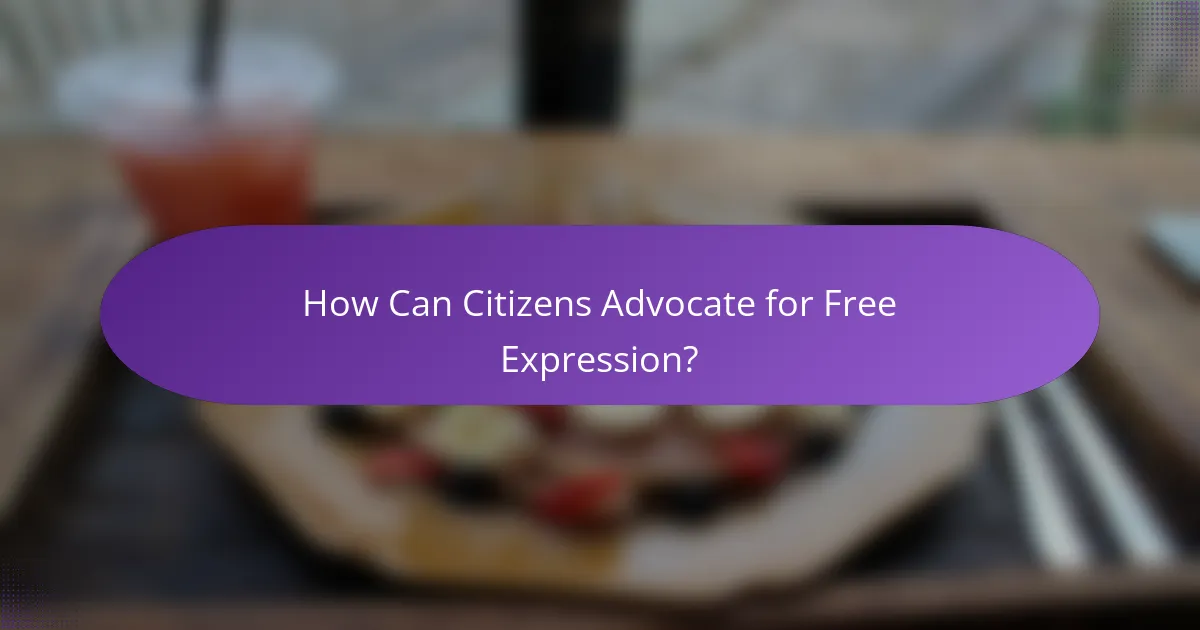
How Can Citizens Advocate for Free Expression?
Citizens can advocate for free expression through various methods that promote open dialogue and challenge censorship. By actively participating in public campaigns, local governance, and collaborating with non-governmental organizations (NGOs), individuals can influence policies and foster a culture of free speech.
Engaging in public campaigns
Public campaigns are essential for raising awareness about the importance of free expression. Citizens can join or initiate campaigns that focus on specific issues, such as defending journalists or opposing restrictive laws. Utilizing social media platforms can amplify their message and reach a broader audience.
Participating in protests, signing petitions, or organizing community events can also mobilize support. It is crucial to ensure that these campaigns are inclusive and represent diverse voices to strengthen their impact.
Participating in local governance
Engaging in local governance allows citizens to influence decision-making processes that affect free expression. Attending town hall meetings, joining advisory boards, or running for local office can provide opportunities to advocate for policies that protect free speech.
Citizens should familiarize themselves with local laws and regulations regarding expression and advocate for reforms when necessary. Building coalitions with like-minded individuals can enhance their effectiveness in pushing for change.
Collaborating with NGOs
Partnering with NGOs that focus on human rights and free expression can amplify advocacy efforts. These organizations often have resources, expertise, and networks that can support local initiatives. Citizens can volunteer, attend workshops, or participate in campaigns organized by these NGOs.
Additionally, NGOs can provide valuable training on effective advocacy strategies and legal protections for free speech. Engaging with these organizations helps create a more robust movement for defending democratic values and public discourse.
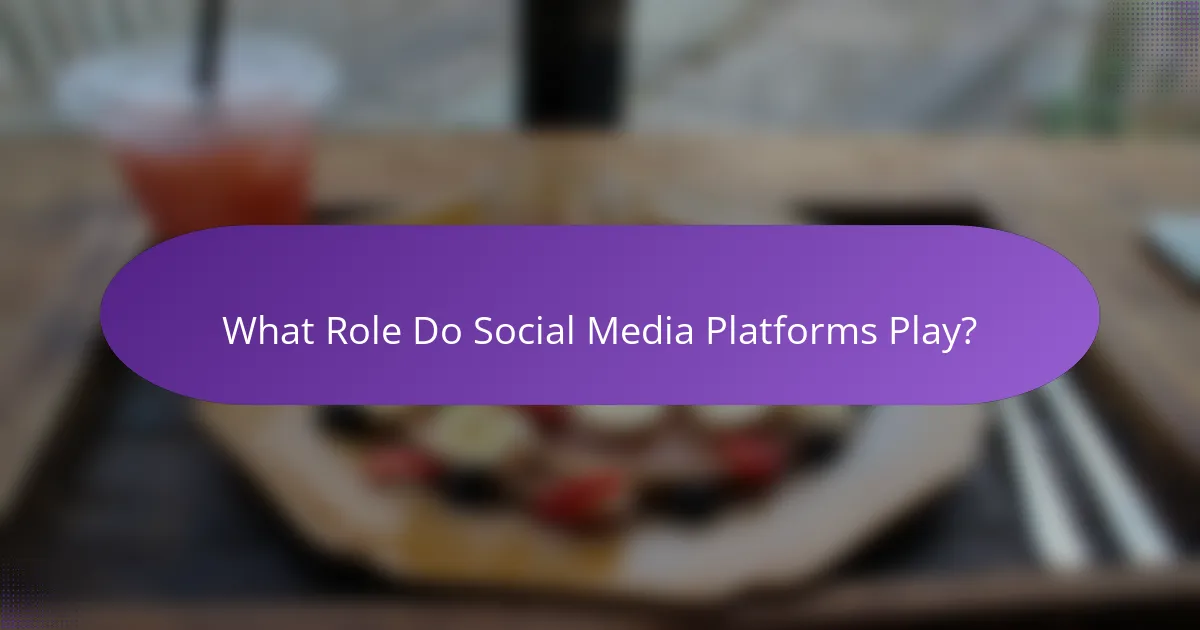
What Role Do Social Media Platforms Play?
Social media platforms significantly influence public discourse and democracy by controlling the flow of information. Their policies and algorithms shape what users see, which can impact societal opinions and political engagement.
Content moderation policies
Content moderation policies dictate what is acceptable on social media platforms, often balancing between free expression and the need to prevent harmful content. These policies can vary widely, with some platforms enforcing strict rules against hate speech and misinformation, while others may adopt a more lenient approach.
For example, platforms like Facebook and Twitter have implemented community guidelines that outline prohibited content, which can lead to post removals or account suspensions. Users should familiarize themselves with these policies to avoid unintended violations.
Algorithms affecting visibility
Algorithms play a crucial role in determining which posts appear in users’ feeds, often prioritizing content based on engagement metrics. This means that posts that generate more likes, shares, or comments are more likely to be seen, potentially sidelining less popular but important information.
As a result, users may encounter a skewed representation of public opinion, as trending topics may not always reflect the broader societal views. Understanding how these algorithms work can help users navigate their feeds more effectively and seek diverse perspectives.
Partnerships with governments
Social media platforms often engage in partnerships with governments to address issues like misinformation and public safety. These collaborations can lead to increased scrutiny of content, where platforms may be pressured to remove posts that governments deem inappropriate.
While such partnerships can enhance safety and security, they also raise concerns about censorship and the potential suppression of dissenting voices. Users should remain aware of these dynamics and consider the implications for free speech in their respective countries.
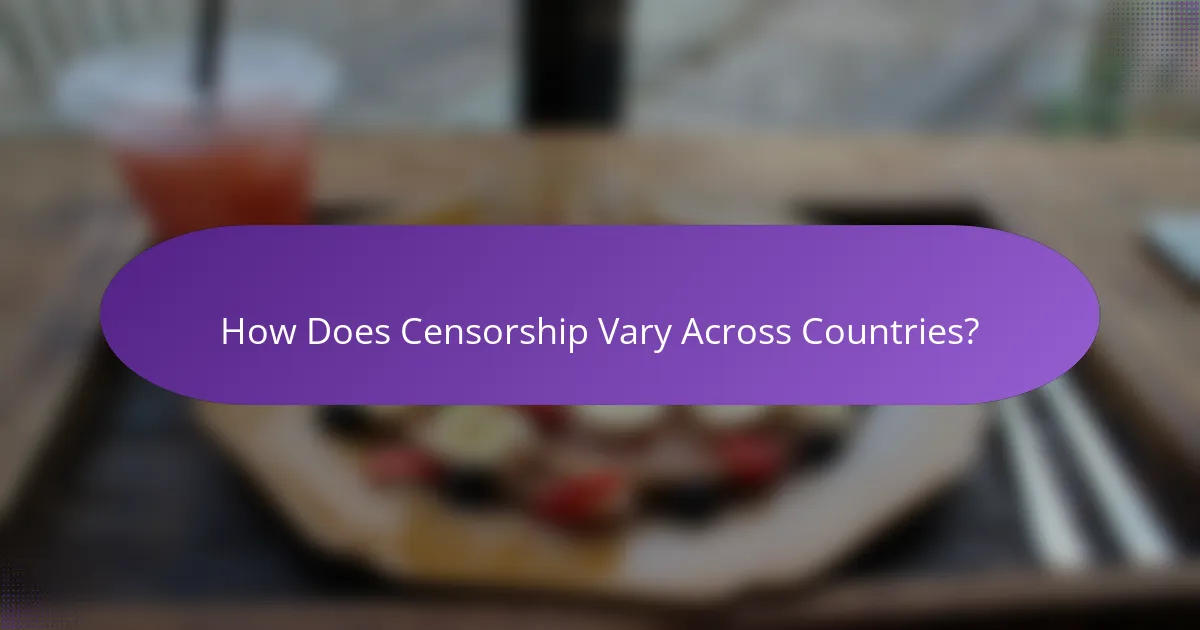
How Does Censorship Vary Across Countries?
Censorship varies significantly across countries, influenced by political systems, cultural norms, and legal frameworks. Authoritarian regimes often impose strict controls on media and public discourse, while democratic nations typically uphold free speech, albeit with some limitations.
Comparative analysis of regimes
In authoritarian regimes, censorship is a tool for maintaining power, often involving state control over media outlets and the suppression of dissenting voices. This can manifest as the banning of certain publications, internet restrictions, and the persecution of journalists.
Conversely, democratic countries usually promote free expression but may still implement regulations to protect national security, public order, or individual rights. These regulations can include laws against hate speech or misinformation, which can sometimes lead to debates about the limits of free speech.
Case studies: China vs. USA
In China, the government exercises extensive censorship through the Great Firewall, blocking access to foreign websites and controlling domestic media. This results in a heavily curated narrative that aligns with state interests, limiting public discourse and dissent.
In contrast, the USA has a robust legal framework protecting free speech under the First Amendment. While there are instances of content moderation on social media platforms, the overall environment allows for a wide range of opinions and open debate, although challenges like misinformation and hate speech remain contentious issues.
